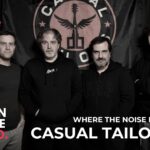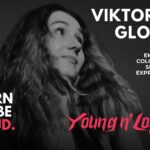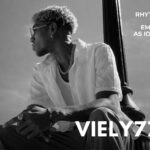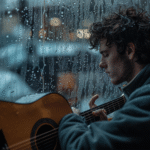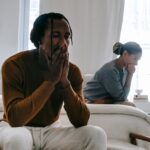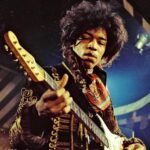Now Reading: Born Pessimist Open the Door to the Dark with This Sunless Space – An Interview –
-
01
Born Pessimist Open the Door to the Dark with This Sunless Space – An Interview –
Born Pessimist Open the Door to the Dark with This Sunless Space – An Interview –

In this candid interview, Born Pessimist pull back the curtain on their raw and stripped-back EP This Sunless Space, marking a striking turn from their usual synthesis of punk, industrial, and rap. What began as frustration and creative exhaustion became a deeply personal project that sees the band swapping 808s and distortion for an acoustic guitar and an unflinching look at emotional darkness.
From conversations about chasing the vocal power of k.d. lang while holding onto the grit of Corpsegrinder, to exploring what it means to create without label pressures, the band reflect on rediscovering the joy of music and the strange comfort of confronting bleakness head-on. This interview is an invitation to sit with that darkness and feel the sparks that fly in its wake.
This Sunless Space marks a stark shift from your usual punk, industrial, and rap-infused sound. What prompted you to strip everything back and take such a bare-bones approach this time?
Honestly, it started with a little self-hate and frustration with my own process, so I had to turn that into something positive because I was giving up. I’ve always been drawn to working fast in that Beat Generation way of first thought, best thought and improvising like jazz. That’s how it was with our first EP, Shock and Awe. I’d get tracks, drive around screaming ideas in the car, loop parts until they clicked, then head into the studio with The CDC, my engineer and best friend of twenty-five years to lay down vocals. I’d step back for a week, listen fresh, and then shape the mix into something real. From there, I’ll send mixes to The CDC, and if he’s into it, I know I’m close. Then it goes to his wife, Avery, for the final thumbs-up. At that point, the only pressure left is making myself, my friends, and our listeners in the UK and Brazil happy. That’s the benefit of staying independent because I don’t have a label breathing down my neck. It keeps the joy in the process. If this ever felt like just another job, I’d walk away. And that’s what happened. This last batch was bad. Nothing. No spark. I had songs musically ready, but the vocals felt rough, and I wasn’t in the right headspace when I recorded them. I couldn’t release something that didn’t match the quality of the producers I work with like Deville, Whodunit, Blackfire Production, or Requiem Beatz. They give the world their best music and I owe them the same if I am going to take it and make it my own. In my head, I’m chasing the vocal beauty of artists like k.d. lang or Kaleida while also hitting the grittiness of Randy Blythe and Corpsegrinder and then fusing it all together like Stu Block from Into Eternity or Devin Townsend. But forcing it on top of bad takes just wasn’t working. So, out of that frustration, I went back to where I started with the same acoustic guitar I stole out of my dad’s closet. I dug through old demos, played with open tunings and capos, and rediscovered a way to emote without overthinking. It was therapeutic and it reminded me that Born Pessimist doesn’t have to be a one-trick pony of punky death metal rap with 808s and industrial grit. We can show range, strip it down, and still hit hard. This release grew out of frustration, but it’s also proof of growth as artists and, in the end, it was a very enjoyable way forward.
Recording without outside producers or beatmakers can feel like stepping into uncharted territory. How has that autonomy shaped the music and the emotions it carries?
Well, that’s really the punk part of the band and that whole DIY spirit. I got tired of waiting around for band members to show up or for things to click. Back in school, we’d write and jam all the time, but distractions outweighed the music and I realized I could cut out the middleman by finding producers online since I can pick up songs quickly and write around them just as quick. A big influence on us is Nine Inch Nails because they evolve live depending on who’s on stage. All the songs are still solid, but they just grow in different directions. With this project, I wanted to strip it down even further: just me, my acoustic guitar, a few harmonies with myself, and some stomps or claps for percussion. Nothing fancy, no samples, no electronics. Just something different raw. Lyrically, I often come in with prebaked lines or ideas. I like rap a lot and how those refrains and repetitions that turn into an earworm like in our song, Anesthetize, with the line “Breathe in, breathe out, breathing new life” as an example of that. Writing every part from start to finish was a fun challenge because I had to think critically about how I’d actually perform it. You got to play and sing at the same time and still work on balancing complexity with playability. We’re not Dream Theater doing that whole “pat your head, rub your stomach” kind of thing, but I still like testing my limits in a good way.
The title, This Sunless Space, feels heavy and loaded with meaning. What does it represent for you personally, and how does it thread through the three songs?
That’s a good question. The title This Sunless Space actually came from CDC since part of our process is banking titles and lines. I wasn’t married to it at first, but then my friend Dannika made a really insightful comment about how most of space is actually sunless. Light travels through it, but the distance between stars is… well, a lot of space. In between one point of light and the next, you’ve got to pass through a lot of darkness. I liked that idea of how the journey may not be easy and will probably be miserable, but you’ve got plenty of time to figure things out along the way. To me, that really fit the mood of what I was writing. The songs themselves all wrestle with that theme. Deadbeat Hero takes its name from a Doug Stanhope comedy special and it’s sort of an homage to some of that outlaw-country-meets-punk vibe. I love how old country artists like Waylon and Johnny sang about really dark stuff like heartbreak and crime and being flawed as human. It’s the same thing here. Instead of a superhero with a perfect moral compass, you get a broken figure who’s strung out, loveless, and, by the end, is just used up and discarded. The people are like, “Hey, thanks for saving us. Wait, you need something? Hard pass. No thanks.” It’s more in line with the noir vibe of Sin City than anything heroic. A Grain of Salt is more abstract. I have no idea what it’s about. To me, it feels like the reverse, like someone moving from light back into darkness. It’s sonically brighter almost like a church choir. I layered vocals on that one, so you have a gritty James Hetfield-inspired main line that gets distorted over time, a smoother, deeper tone that compliments , and then a really soft falsetto like Michael McDonald would do just to create a kind of chorus effect. Finally, the title track, This Sunless Space, actually started as an outro track for a podcast CDC was going to do, but, when that didn’t pan out, I built around the music and wrote fresh lyrics. That song is about the frustration of not being special. You’re wanting attention, but not getting it, which turns into resenting the world, and eventually becoming the very monster you hated. It’s about holding onto misery just to feel something. By the end, the repeated line “We’re all moving on” is the acknowledgment that you have to grow out of that darkness. Sometimes that means putting life and friendships in a kind of cryostasis while you figure out your own truth, so that, when you reemerge, you’re not dragging other people through your darkness. Yes, the title suggests gloom, but I actually think the record is about chasing light and clawing your way out of the void, even if the path is jagged and imperfect.
Acoustic arrangements have a way of exposing every lyrical and emotional detail. How did you prepare yourself to be heard in such a raw, unguarded way?
Good question. My first instrument was my voice. Growing up in the church, I was surrounded by hymns and that new-age gospel/soul stuff that I could sing easily. The first real game-changer was hearing Elvis and singing along with that. I had this gold box set of his thirty greatest hits and I thought nothing could top it. Then, in the first or second grade, I had this little clock radio with a headphone jack I’d fall asleep to and I remember hearing Drop It Like It’s Hot, The Real Slim Shady, and Do Ya Chain Hang Low back-to-back on 97.9 The Beat and my little mind was blown. I started writing my own raps until that got derailed in fifth grade when I discovered Queen and everything needed to sound like them. The same thing happened in sixth grade, when my band director introduced me to Metallica, which led me deep into the thrash scene of the other Big 4 bands like Slayer, Megadeth, and Anthrax and then into black and death metal with Cannibal Corpse, Behemoth, Opeth, and Dimmu Borgir. Later in college, I locked into punk music with NOFX, Bad Religion, Against Me!, and the hardcore scene too because rock had sort of died to me and I loved just how upfront all of that music sounded. All of those bands had an honesty to them and, when I started making my own music, I wasn’t willing to compromise on that. Just because I changed it up didn’t mean that I wanted to sacrifice the authenticity. The goal was to record the vocals from start to finish. No stopping. No stitching together. Every song is made up of one takes, mistakes and all, because it needed to feel real and alive to me. I could have gone back and obsessed over every little detail, but that would’ve put me right back in the same headspace of misery I had with my earlier unfinished recordings.
Your previous work carried its fair share of aggression. How did you find channeling that same intensity into a softer, stripped-down sound without losing the heart of what Born Pessimist stands for?
One of the turning points for me musically was meeting Marilyn Manson before a show and he gave me some really good advice. He was a surprisingly kind person to me and I went down that rabbit hole and discovered his acoustic versions of songs from The Pale Emperor. If you go to see live music, it is a religious experience. You can tell when someone is phoning it in because it has become a job for them. I don’t want this to be a job. It’s supposed to be fun. The way I see it, this release should feel like your local theater troupe decided to write a few songs and play them in a coffee shop for some very concerned families. If you listen and think, “Huh, that’s odd.” Well, yeah, it’s supposed to be. We didn’t change the sound. We just changed how we make the sound.
The themes you explore often carry a strong undercurrent of darkness. How do you see This Sunless Space continuing (or perhaps reshaping) that emotional narrative?
I don’t think the themes change that often for us. I think darkness exists in all of us and everybody expresses it differently. I live in my head a lot. I can be obsessive, anxious, and prone to depression and music has become my safe outlet. Rather than turning to chemicals or something that actually hurts me, I visit that darkness in a song, let it out, then go back to happy land. There’s no reason to be stuck there. I’m miserable enough already. Thematically, this record picks up where we left off on America, our last EP/single. Our first song, Shock and Awe, talks about that. Knowledge isn’t absolute. Perception’s not always truth. You can’t just sit in ugly spaces forever. You have to seek some peace and harmony or you’ll fill up with hatred and rot. I want to keep living and creating. I don’t want to die. I’ll be a frozen Futurama head in a glass jar at 150, so I can still get out there and show I’ve still got it. Thematically though, it’s all the same suit with a different tie.
Has this more solitary process changed your relationship with songwriting, and do you see it influencing your future releases?
Yes and no. Writing has always been a pretty solitary process for me. Usually, I’ll find beats, write riffs, or license or commission tracks, then obsess over what rhythms and lyrics go with it. I’ll record a demo, send it to The CDC for a yea or nay, and then refine it from there. That’s how we started with our first volume of music, Endangered Species, and even now, as we’re starting on our next record, Aluminum, the process is still evolving. We’re working on more piano and synths in the songs, but it’ll all still be rooted in gangster rap and death metal. Part of why I work this way is because I know my limits. I’m not a full band by myself, so, instead of being miserable trying to force things I don’t have the technical skills to pull off, I collaborate with musicians and producers who create amazing foundations I can write to. That frees me up to focus on what I do best with the lyrics and vocal melodies. Even if they sound like homicide. The irony is that we usually hate the acoustic stuff when we go to live shows. I love listening to it when I’m at home, but that’s usually the part where CDC and I walk out. If you just got done singing about demons and evil with the amps cranked up to eleven and now you want to break out the stools and tell us to get mellow and listen to a fifteen-minute acoustic jam… yeah, no thanks. So, maybe that’s why making this stripped-down record felt right. It’s the exact opposite of what people expect from us, which makes it both cathartic and a little bit full-circle. You either die the hero or live long enough to become the villain or whatever they said in that Batman movie.
When listeners press play on this EP, what do you hope they sit with once the final notes fade, what feeling or thought do you want to linger?
That’s a really good question. CDC said, “I hope it encourages people to sit with themselves and see themselves. Dealing with our heaviest and darkest emotions is one of the easiest things to do at the end of the day.” And I completely agree. We’re not competing in the Misery Olympics. None of us want to be stuck in darkness forever. If you are, it usually means something positive is missing in your life. So if this record helps someone pause, reflect, or even create something of their own, then that’s the win. Every time I hear new music, I’m looking for that moment I’ve never heard before, and I hope people feel that way when they listen to us. Now, full disclosure: we usually hate the acoustic stuff when we go to live shows. I love listening to it when I’m at home, but that’s usually the part where CDC and I walk out. If you just got done singing about demons and evil with the amps cranked up to eleven and now you want to break out the stools and tell us to get mellow and listen to a fifteen-minute acoustic jam… yeah, no thanks. So, maybe that’s why making this stripped-down record felt right. It’s the exact opposite of what people expect from us, which makes it both cathartic and a little bit full-circle. You either die the hero or live long enough to become the villain or whatever they said in that Batman movie. But maybe that’s why this record works for us. We hope people want more whether that’s here in the States, which we’d love to have embrace us more, or in places like the UK and Brazil, where we’ve already started building some love. At the end of the day, it’s about using music as a way to step out of misery and back into light.
Listen to Born Pessimist on Spotify, and connect with the artist on Instagram.
Interview by Amelia Vandergast








